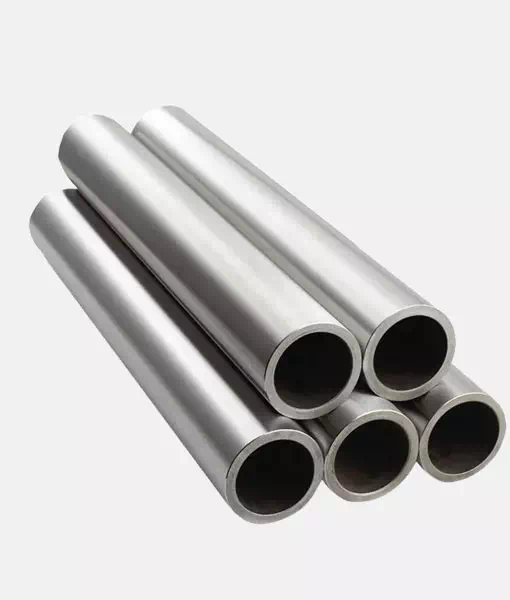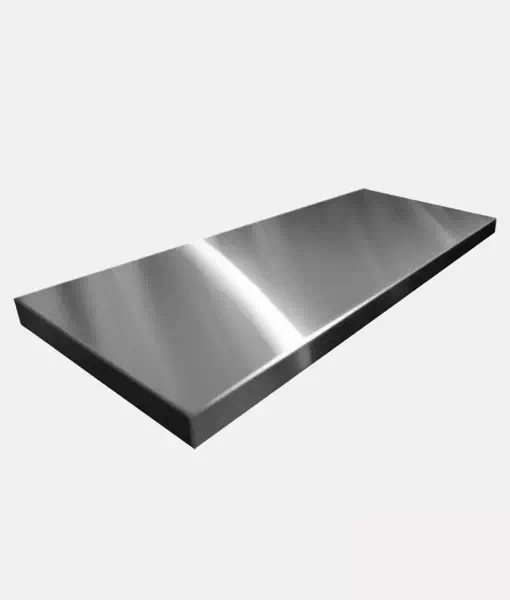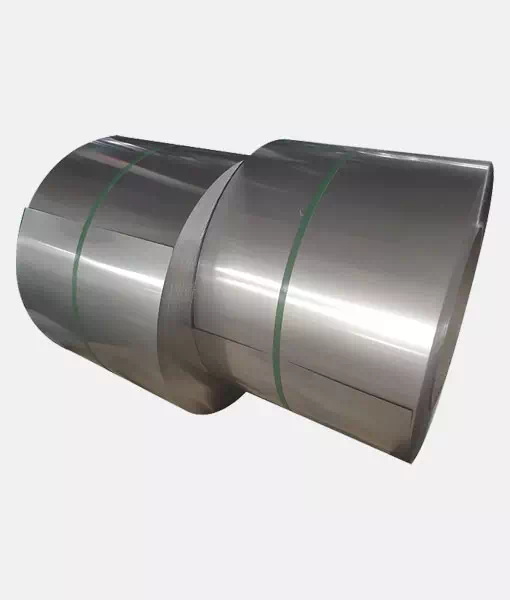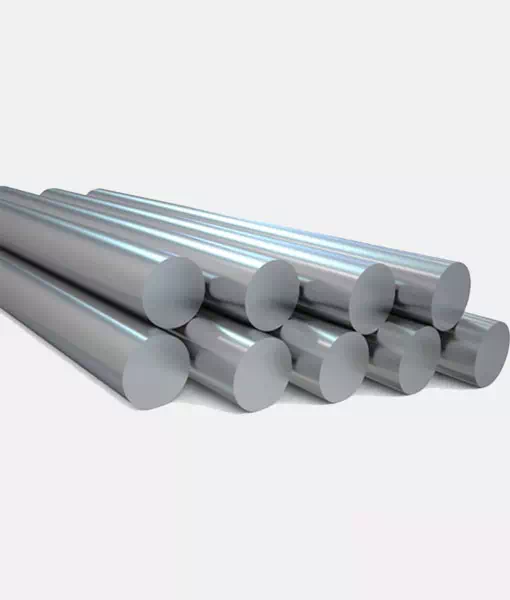3/16" | 1/4" | 3/8" | 1/2" | 5/8" | 3/4" | ||
4.8mm | 6.3mm | 9.5mm | 12.7mm | 15.9mm | 19mm | ||
1" | 1 1/4" | 1 1/2" | 1 3/4" | 2" | |||
25.4mm | 31.8mm | 38.1mm | 44.5mm | 50.8mm | |||
Typical Values (Weight %)
Nickel | 38.0 min.–46.0 max. | Iron | 22.0 min. |
Chromium | 19.5 min.–23.5 max. | Molybdenum | 2.5 min.–3.5 max. |
Molybdenum | 8.0 min.-10.0 max. | Copper | 1.5 min.–3.0 max. |
Titanium | 0.6 min.–1.2 max. | Carbon | 0.05 max. |
Niobium (plus Tantalum) | 3.15 min.-4.15 max. | Titanium | 0.40 |
Carbon | 0.10 | Manganese | 1.00 max. |
Sulfur | 0.03 max. | Silicon | 0.5 max. |
Aluminium | 0.2 max. |
Typical Room Temperature Mechanical Properties, Mill Annealed
psi (min.) | (MPa) | psi (min.) | (MPa) | % (min.) | Rockwell B |
49,000 | 338 | 96,000 | 662 | 45 | 135-165 |
Temperature | Orientation | Impact Strength* | ||
°F | °C | ft-lb | J | |
Room | Room | Longitudinal | 79.0 | 107 |
Room | Room | Transverse | 83.0 | 113 |
-110 | -43 | Longitudinal | 78.0 | 106 |
-110 | -43 | Transverse | 78.5 | 106 |
-320 | -196 | Longitudinal | 67.0 | 91 |
-320 | -196 | Transverse | 71.5 | 97 |
-423 | -253 | Longitudinal | 68.0 | 92 |
-423 | -253 | Transverse | 68.0 | 92 |
Sandmeyer Steel Company stocks Alloy 825 nickel alloy plate in thicknesses from .1875" (4.8mm) through 2.00" (50.8mm) for corrosion resistant applications in the air pollution control, chemical and petrochemical, food processing, nuclear, offshore oil and gas production, ore processing, petroleum refining, steel pickling and waste disposal industries.
Alloy 825 (UNS N08825) is an austenitic nickel-iron-chromium alloy with additions of molybdenum, copper and titanium. It was developed to provide exceptional corrosion resistance in both oxidizing and reducing environments. The alloy is resistant to chloride stress-corrosion cracking and pitting. The addition of titanium stabilizes Alloy 825 against sensitization in the as-welded condition making the alloy resistant to intergranular attack after exposure to temperatures in a range that would sensitize un-stabilized stainless steels. The fabrication of Alloy 825 is typical of nickel-base alloys, with material being readily formable and weldable by a variety of techniques.
for Alloy 825 (UNS N08825)
W.Nr. 2.4858:
An Austenitic Nickel-Iron-Chromium Alloy Developed for Exceptional Corrosion Resistance In Both Oxidizing and Reducing Environments
· General Properties
· Applications
· Standards
· Chemical Analysis
· Physical Properties
· Mechanical Properties · Corrosion Resistance
· Stress-Corrosion Cracking Resistance
· Pitting Resistance
· Crevice Corrosion Resistance
·  Intergranular Corrosion Resistance
Alloy 825 (UNS N08825) is an austenitic nickel-iron-chromium alloy with additions of molybdenum, copper and titanium. It was developed to provide exceptional resistance to numerous corrosive environments, both oxidizing and reducing.
The nickel content of Alloy 825 makes it resistant to chloride stress-corrosion cracking, and combined with molybdenum and copper, provides substantially improved corrosion resistance in reducing environments when compared to conventional austenitic stainless steels. The chromium and molybdenum content of Alloy 825 provides resistance to chloride pitting, as well as resistance to a variety of oxidizing atmospheres. The addition of titanium stabilizes the alloy against sensitization in the as-welded condition. This stabilization makes Alloy 825 resistant to intergranular attack after exposure in the temperature range which would typically sensitize un-stabilized stainless steels.
Alloy 825 is resistant to corrosion in a wide variety of process environments including sulfuric, sulfurous, phosphoric, nitric, hydrofluoric and organic acids and alkalis such as sodium or potassium hydroxide, and acidic chloride solutions.
The fabrication of Alloy 825 is typical of nickel-base alloys, with material readily formable and weldable by a variety of techniques.
· Air Pollution Control
o Scrubbers
· Chemical Processing Equipment
o Acids
o Alkalis
· Food Process Equipment
· Nuclear
o Fuel Reprocessing
§ Fuel Element Dissolvers
o Waste Handling
· Offshore Oil and Gas Production
o Seawater Heat Exchangers
o Piping Systems
o Sour Gas Components
· Ore Processing
o Copper Refining Equipment
· Petroleum Refining
o Air-cooled Heat Exchangers
· Steel Pickling Equipment
o Heating Coils
o Tanks
o Crates
o Baskets
· Waste Disposal
o Injection Well Piping Systems
ASTM..................B 424
ASME..................SB 424
Density
0.294 lbs/in3
8.14 g/cm3
0.105 BTU/lb-°F
440 J/kg-°K
28.3 psi x 106 (100°F)
196 MPa (38°C)
1.005 Oersted (μ at 200H)
76.8 BTU/hr/ft2/ft-°F (78°F)
11.3 W/m-°K (26°C)
2500 – 2550°F
1370 – 1400°C
678 Ohm circ mil/ft (78°F)
1.13 μ cm (26°C)
7.8 x 10-6 in / in°F (200°F)
4 m / m°C (93°F)
Alloy 825 has good mechanical properties from cryogenic to moderately high temperatures. Exposure to temperatures above 1000°F (540°C) can result in changes to the microstructure that will significantly lower ductility and impact strength. For that reason, Alloy 825 should not be utilized at temperatures where creep-rupture properties are design factors. The alloy can be strengthened substantially by cold work. Alloy 825 has good impact strength at room temperature, and retains it’s strength at cryogenic temperatures.





Sales hotline:

 Scan and consult wechat customer service
Scan and consult wechat customer service